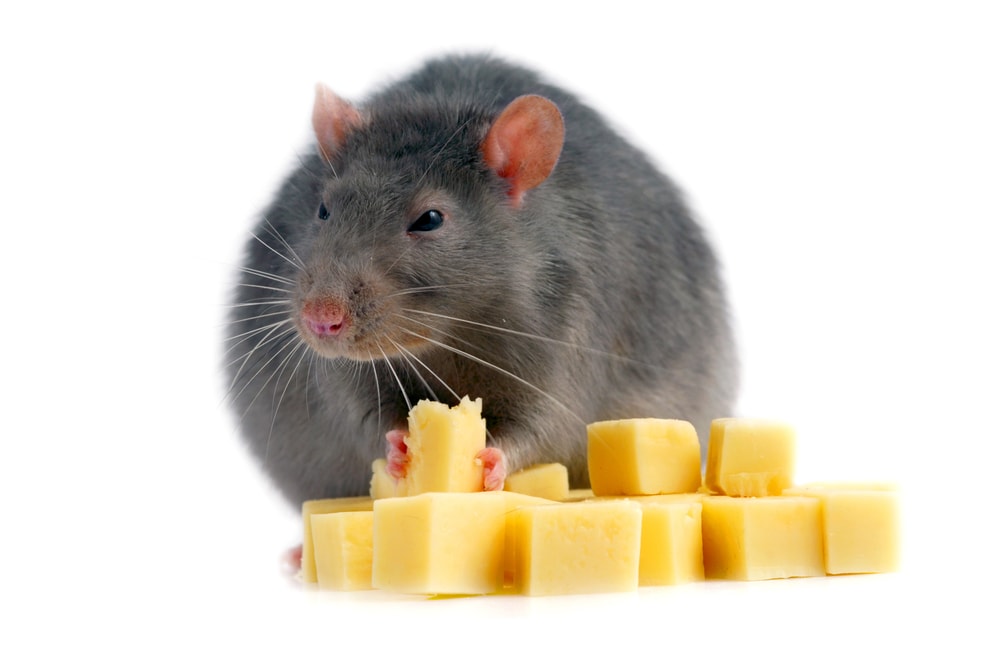We are the generation of Tom and Jerry. Nearly all of us have watched Jerry stuff his mouth with cheese blocks that are even bigger than the character himself. However, in reality, mice and rats do not eat that much cheese. Some types are too unsafe for even consumption. This leads to a thoughtful question. Can rats eat cheese? Normally, not many people would bother themselves with this information. However, if you have a pet rat, then you need to know a bit more about this topic. Should you feed cheese to your rat? Many of us unintentionally feed our pets stuff that simply is not compatible with their digestive system. Is cheese one of those eatables? Let us find out in this discussion.
How cheese is made?
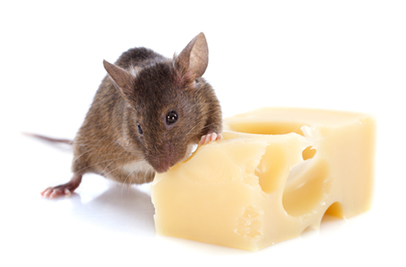
Well, is not it amazing? We are in the 21st century, and yet some of us are not aware of the way cheese is made. Well, cheese is made by preservation. All that you have to do is store the milk for a considerable period. Cows and goats are not the only sources of milk for cheese. The fermentation process is suitable for the milk of horses, camels, and certain other animals as well. What kind of cheese you get depends on the time and additives that you add to milk. Extra stuff like nuts berries and herbs are added sometimes. These are the primary determinants as well; the ones, which decide which type of cheese your rat, can or cannot, eat. Hard cheeses like parmesan are the strongest ones, we are not sure even you could manage a giant slice of it or not. You can already see why cheese is a bit of a risky business, cannot you?
Is rats lactose intolerant?
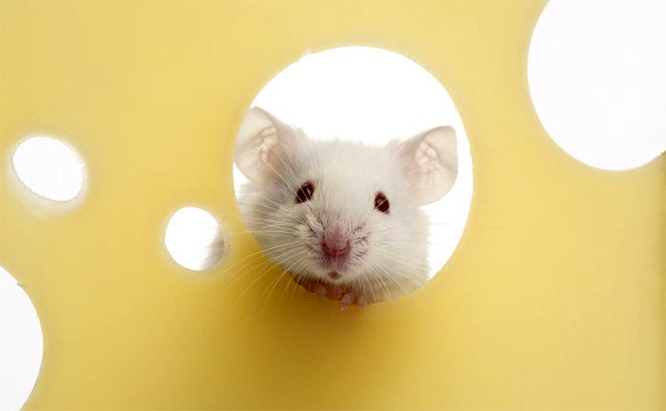
Well, if you feed your rat too much milk and cheese, what do you expect? What were you thinking anyway? Have you watched too much of Tom and Jerry like us? It is commonly believed that rats are lactose intolerant. While it is true that excessive amounts of milk or cheese interfere with their metabolic process, rats can hardly be tagged as lactose intolerant. If the levels of cheese fed to the rat are low, then there is not going to be a major issue. Notice the emphasis on the word level here. The quantity matters the most. For the sake of this discussion, we can safely assume that rats are not lactose intolerant at lower concentrations of cheese and milk. It is a myth.
The short answer
Now, let us answer the question around which this whole discussion has been orchestrated. Can rats eat cheese? Well, both yes and no. We can see that you are not satisfied with the short answer, so we will elaborate. You see, there are various kinds and varieties of cheese. Not all of them are suitable for the digestive system of your rat. Serious health complications can develop in case you feed your pet rat, the wrong type of cheese. Hence, the idea is to do some research before feeding your rat this brand of food. Trust us; it is worth your time. In the upcoming passages, we discuss this point in detail.
Rats and processed foods
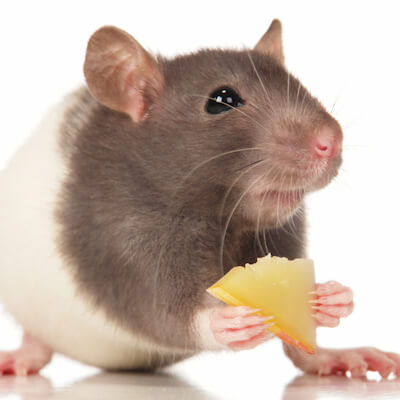
Before we go any further, it is prudent to comment on the processed foods and their suitability for your pets. Normally, processed foods undergo a lot of changes, whenever they are cooked or fortified in any manner. The nutritional values are changed tremendously, this results in a food item that ideally should not be given to pets. Sometimes, even humans should avoid eating some of the stuff they have created through supplementation and fortification. However, because there are no immediate reactions or responses shown by the body, people assume all is safe. Of course, that means that your pet is also eating the same thing as you. It is simply because you cannot live without sharing food with your furry friend. Processed cheese is no exception to this rule. You find people eating it all over the world. Not eating just by themselves, of course, they share it with their pets too.
Yes-yes cheese
Cheese must be given as an occasional treat only. We dare say that there are some types of cheese, which are all right for your pet rat if given in moderate amounts. Which ones, you ask? Well, any cheese that is made from the milk of cow or goat simply is fine by your rat. What do we mean by a simple manner? Well, we talked about processed foods earlier; there was a good reason why we did that. You see, additives and extras are not going to do any good to your pet rats’ health. Hence, if you have cheese that is stuffed with nuts, for example, you cannot give it to your rat. Cheeses, which are rat-safe, include Cheddar, Colby, Gouda, and a few others.
No-no cheese
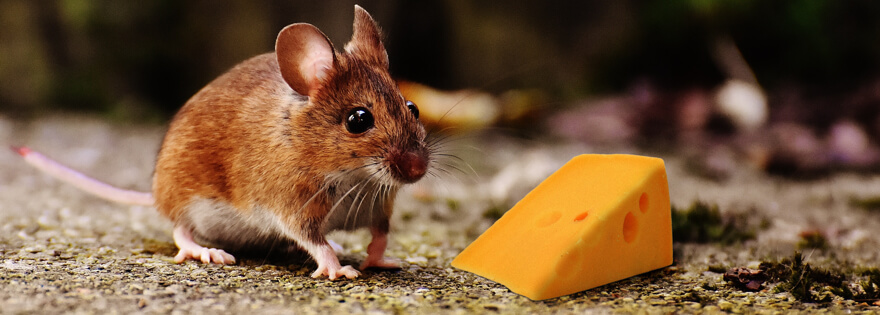
These would have to be your heavily processed cheeses. It is ok if there is a little bit of tinkering done while making cheese. However, excess of it is bad for your rats’ health. Rats cannot eat cheese that is too soft, or too chewy. They cannot break down that lump of cheese; hence, they face a choking hazard. Soft cheese, despite no processing, still must not be given to a pet rat. Some of the cheeses that are off the menu for your rat include Mozzarella, Feta, Cottage, Cream, and Ricotta cheese.
What about blue cheese?
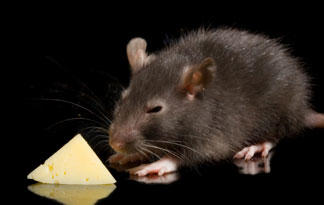
Fancy thing, that blue cheese. It is. Have you ever wondered why it is blue though? Oh, it has nothing to do with sad cows’ milk, please dispense with that ridiculous idea. No, it made blue on purpose. How it is done is also very interesting. A fungus called Penicillium is added to the lumps of cheese that are meant to become blue cheese. Have you noticed the air holes on a slice of cheese? These are made first using nails, and then fungus is introduced, right in the center. After that, your job is done. You will have blue cheese when the fermentation is completed. Now, can rats eat it? Well, just like the myth about rats and lactose intolerance, we dare say it is not much wrong with blue cheese either. People seem strangely reluctant about feeding their pet rats, the blue cheese. We cannot understand why, but if in doubt, leave it out anyways. Anyways, it is safe for your rat.
Conclusion
Well, that is all from this discussion. We wish we could go on. However, we have limited space and we are sure you are running on a tight schedule as well. However, before we go, there are a couple of points we would like to highlight in these concluding remarks. If you feel that feeding cheese makes your rat all depressed and apathetic, maybe you should drop the idea. Also, in case things seem to get out of the hands, it is best to get a vet on board. He or she can tell what the matter with your rat is more satisfactorily. Remember the bit about low quantity as well. You cannot expect your rat to digest giant slices of cheese, like Jerry from the cartoons!
